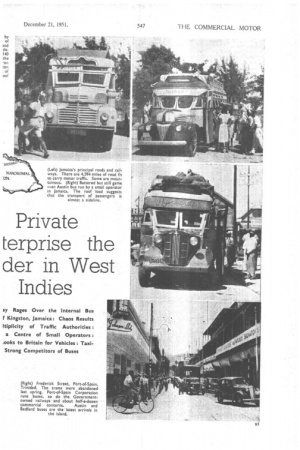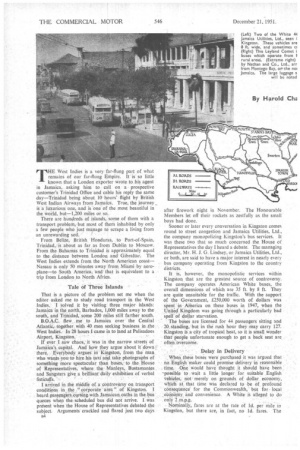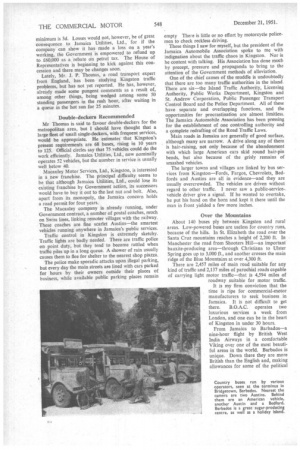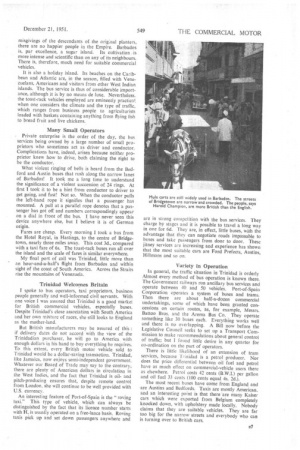Private terprise the der in West Indies
Page 39

Page 38

Page 40

Page 41

If you've noticed an error in this article please click here to report it so we can fix it.
By Harold Cha THE West Indies is a very far-flung part of what remains of our far-flung Empire. Ii is so little known that a London exporter wrote to his agent in Jamaica, asking him to call on a prospective customer's Trinidad Office and cable his reply the same day—Trinidad being about 10 hours' flight by British West Indian Airways from Jamaica. True, the journey _ is a luxurious one, and is One of the most beautiful in the world, but-1,200 miles or so.
There are hundreds of islands, some of them with a transport problem, but most of them inhabited by only a few people who just manage to scrape a living from an unrewarding soil.
From Belize, British Honduras, to Port-of-Spain, Trinidad, is about as far as from Dublin to Moscow. From the Bahamas to Trinidad is approximately equal to the distance between London and Gibraltar. The West Indies extends from the North American coast— Nassau is only 50 minutes away from Miami by aeroplane—to South America, and that is equivalent to a trip from London to North Africa.
.• ..
Tale of Three Islands
That is a picture of the problem set me when the editor asked me to study road transport in the West Indies. I solved it by visiting three major islands: Jamaica in the north, Barbados, 1,000 miles away to the south, and Trinidad, some 200 miles still farther south.
B.O.A.C. flew me to Jamaica over the Central Atlantic, together with 40 men seeking business in ,the West Indies. In 28 hours I came in to land at Palisadoes Airport, Kingston. If ever I saw chaos, it was in the narrow streets of Jamaica's capital. And how they argue about if down there. Everybody argues in Kingston, from the man who wants you to hire his taxi and take photographs of something more spectacular than buses, to the ,House of Representatives, where the Manleys, Bustamantes and Sangsters give a brilliant daily exhibition of verbal fisticuffs.
I arrived in the middle of a controversy on transport conditions in the corporate area of Kingston. I heard passengirS.Ottrsing with Jamaican oaths in the bus queues when the scheduled bus did not arrive. I was present when the House of Representatives debated the subject. Arguments crackled and flared just two days after firework night in November. The Honourable Members let off their rockets as zestfully as the small boys had done.
Sooner or later every conversation in Kingston comes round to street congestion and Jamaica Utilities, Ltd., the company monopolizing Kingston's bus services. It was these two that so much concerned the House of Representatives the day I heard a debate. The managing director, Mr. H. J. G. Lindsey, or Jamaica Utilities, Ltd., or both, are said to have a major interest in nearly every bus company operating from Kingston to the country districts.
It is, however, the monopolistic services within Kingston that are the greatest source of controversy. The company operates American White buses, the overall dimensions of which are 35 ft. by 8 ft. They are quite unsuitable for the traffic. With the Support of the Government, £250,000 worth of dollars was spent in America on these buses in 1947, when the United Kingdom was going through a particularly bad spell" of dollar starvation.
The buses are licensed for 44 passengers sitting and 20 standing, but in the rush hour they may carry 127. Kingston is a city of tropical heat, so it is small wonder that' people unfortunate enough to get a back seat are often overcome
Delay in Delivery
• When these buses Were purchased it was argued that no English maker could promise delivery in:reasonable , _
time One would have thought It should have been -possible to ;Wait a little longer for suitable ,English vehicles,not merely on grounds of dollar economy, Which"at that time was declared to be of profound • consequence for the Commonwealth, but for local eeOporiiy, and convenience, A White is alleged to do only 2 m.p.g.
Nominally, fares are at the rate of id. per Mile in Kingston, but there are, in fact, no id. fares. The minimum is 3d. Losses would not, however, be of great consequence to Jamaica Utilities, Ltd., for if the company can show it has made a loss on a year's working, the Government is empowered to refund up to £60,000 as a rebate on petrol tax. The House of Representatives is beginning to kick against this concession and there may be changes soon.
Lately, Mr. J. P. Thomas, a road transport expert from England, has been studying Kingston traffic problems, but has not yet reported. He has, however, already made some pungent comments as a result of, among other things, being wedged among some 50 standing passengers in the rush hour, after waiting in a queue in the hot sun for 25 minutes.
Double-deckers Recommended
Mr Thomas is said to favour double-deckers for the metropolitan area, but I should have thought that a large fleet of small single-deckers, with frequent services, would be appropriate. He estimates that Kingston's present requirements are 68 buses, rising in 10 years to 125. Official circles say that 75 .vehicles could do the work efficiently. Jamaica Utilities, Ltd., now nominally operates 52 vehicles, but the number in service is usually well below 40.
Macauley Motor Services Ltd., Kingston, is interested in a new franchise. The principal difficulty seems to be that although Jamaica Utilities, Ltd., could lose its existing franchise by Government action, its successors would have to buy it out to the last nut and bolt. Also, apart from its monopoly, the Jamaica concern holds a road permit for four years.
The Macauley company is already running, under Government contract, a number of postal coaches, much on Swiss lines, linking remoter villages with the railway. These coaches are fine scarlet Austins—the smartest vehicles running anywhere in Jamaica's public services.
Traffic control in Kingston is extremely sketchy. Traffic lights are badly needed. There are traffic police on point duty, but they tend to become rattled when traffic piles up in a long queue. A shower of rain usually causes them to flee for shelter to the nearest shop piazza.
The police make sporadic attacks upon illegal parking, but every day the main streets are lined with cars parked for hours by their owners outside their places of business, while available public parking places remain empty There is little or no effort by motorcycle policemen to check reckless driving.
These things I saw for myself, but the president of the Jamaica Automobile Association spoke to me with indignation about the traffic chaos in Kingston. Nor is he content with talking. His Association has done much by precept, pressure and propaganda to bring to the attention of the Government methods of alleviation.
One of the chief causes of the muddle is undoubtedly that there are too many traffic authorities in the island. There are six—the Island Traffic Authority, Licensing Authority, Public Works Department, Kingston and St. Andrew Corporation, Public Passenger Transport Control Board and the Police Department. All of these have separate and overlapping functions, and the opportunities for procrastination are almost limitless. The Jamaica Automobile Association has been pressing for the establishment of one controlling authority and a complete redrafting of the Road Traffic Laws.
Main roads in Jamaica are generally of good surface, although many are narrow. A drive along any of them is hair-raising, not only because of the abandonment with which large American cars skid round hair-pin bends, but also because of the grisly remains of smashed vehicles. .
The larger towns and villages are linked by bus services from Kingston—Fords, Fargos, Chevrolets, Bedfords and Austins are all in evidence—and they are usually overcrowded. The vehicles are driven without regard to other traffic. I never saw a public-service-. vehicle driver give a signal. If he wanted to overtake, he put his hand on the horn and kept it there until the man in front yielded a few more inches.
Over the Mountains About 140 buses ply between Kingston and rural areas. Low-powered buses are useless for country runs, because of the hills. In St. Elizabeth the road over the Santa Cruz mountains reaches a height of 2,200 ft. In Manchester the road from Shooters Hill—an important bauxite-producing area—through Christiana to Ulster Spring goes up to 3,000 ft., and another crosses the main ridge of the Blue Mountains at over 4,300 ft.
There are 2,457 miles of main road suitable for any kind of traffic and 2,137 miles of parochial roads capable of carrying light motor traffic—that is 4,594 miles of roadway suitable for motor traffic.
It is my firm conviction that the time is ripe for commercial-motor manufacturers to seek business in Jamaica. It is not difficult to get there. B.O.A.C. operates two luxurious services a week from London, and one can be in the heart of Kingston in under 30 hours.
From Jamaica to Barbados—a nine-hour flight by British West India Airways in a comfortable Viking over one of the most beautiful areas in the world. Barbados is unique. Down there they are more British than the English and, making allowances for some of the political misgivings of the descendants of the orig:nal planters, there are no happier people in the Empire. Barbados is, par excellence, a sugar island. Its cultivation is more intense and scientific than on any of its neighbours. There is, therefore, much need for suitable commercial vehicles.
It is also a holiday island. Its beaches on the Caribbean and Atlantic are, in the season, filled with Venezuelans, Americans and visitors from other West Indian islands. The bus service is thus of considerable importance, although it is by no means de luxe. Nevertheless, the toast-rack vehicles employed are eminently practical when one considers the climate and the type of traffic, which ranges from business people to agriculturists loaded with baskets containing anything from flying fish to bread fruit and live chickens.
Many Small Operators • Private enterprise is the order of the day, the bus services being owned by a large number of small proprietors who sometimes act as driver and conductor. Complications have, indeed, arisen because neither proprietor knew how to drive, both claiming the right to be the conductor.
What violent ringing of bells is heard from the Bedford and Austin buses that rush along the narrow lanes of Barbados! It took me a long time to understand the significance, of a violent succession of 24 rings. At first I took it to be a hint from conductor to driver to get going, and fast! Not so. When the conductor pulls the left-hand rope it signifies that a passenger has mounted. A pull at a parallel rope denotes that a passenger has got off and numbers correspondingly appear on a dial in front of the bus. I have never seen this device anywhere else, but I believe it is of German origin.
Fares are cheap. Every morning I took a bus from the Hotel Royal, in Hastings, to the centre of Bridgetown, nearly three miles away. This cost 3d., compared with a taxi fare of 6s. The toast-rack buses run all over the island and the scale of fares is similar everywhere.
My final port of call was Trinidad, little more than an hour-and-a-half's flight from Barbados and within sight of the coast of South America. Across the Straits rise the mountains of Venezuela.
Trinidad Welcomes Britain
I spoke to bus operators, taxi proprietors, business people generally and well-informed civil servants. With one voice I was assured that Trinidad is a good market for British commercial vehicles, especially buses. Despite Trinidad's close association with South America and her own mixture of races, she still looks to England as the mother-land.
But British manufacturers may be assured of this : if delivery dates do not accord with the view of the Trinidadian purchaser, he will go to America with enough dollars in his hand to buy everything he requires. To this extent, every British motor vehicle sold to Trinidad would be a dollar-saving transaction. Trinidad, like Jamaica, now enjoys semi-independent government Whatever our Board of Trade may say to the contrary, there are plenty of American dollars in circulation in the West Indies, and the fact that Trinidad is oiland pitch-producing ensures that, despite remote control from London, she will continue to be well provided with U.S. currency.
An interesting feature of Port-of-Spain is the "roving taxi." This type of vehicle, which can always be distinguished by the fact that its licence number starts with H, is usually operated on a free-lance basis. Roving taxis pick up and set down passengers anywhere and
are in strong competition with the bus services. They charge by stages and it is possible to travel a long way in one for 6d. They are, in effect, little buses, with the advantage that they can negotiate roads impassable to buses and take passengers from door to door. These jitney services are increasing and experience has shown that the most suitable cars are Ford Prefects, Austins, Hillmans and so on.
Variety in Operation
In general, the traffic situation in Trinidad is orderly
Almost every method of bus operation is known there. The Government railways run ancillary bus services and operate between 40 and 50 vehicles. Port-of-Spain Corporation operates a system of buses and trams. Then there are about half-a-dozen commercial undertakings, some of which have been granted concessions on certain routes, as, for example, Messrs. Battoo Bros. and the Arema Bus Co. They operate something like 30 buses each. Everything works well and there is no overlapping. A Bill now before the Legislative Council seeks to set up a Transport Commission to make recommendations about general control of traffic; but I found little desire in any quarter for co-ordination on the part of operators.
There is little likelihood of an extension of tram
services, because Trinidad is a petrol producer. Nor does the price differential between oil fuel and petrol have as much effect on commercial-vehicle users there as elsewhere. Petrol costs 42 cents (B.W.I.) per gallon and oil fuel 33 cents (100 cents equal 45. 2d.).
The most recent buses have come from England and
are Austins and Bedfords. Taxis are mostly American, and an interesting point is that there are many Kaiser cars which were exported from Belgium completely knocked down, with upholstery made locally. Nobody claims that they are suitable vehicles. They are far too big for the narrow streets and everybody who can is turning over to British cars.












































































